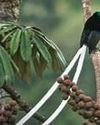The Camera as a Conservation Tool.

It was early August 2015, and I boarded a flight to Nagpur to have a one-on-one with the Honorable Chief Minister (CM) of Maharashtra about the importance of having wildlife underpasses in strategic locations on the National Highway -7 (NH-7) that was on the verge of being upgraded from two to four lanes and in the process permanently severing the corridor between Pench and other tiger-bearing areas to the east such as Navegaon-Nagzira and Kanha. In my meeting with the CM, instead of getting into an emotional rant on how wildlife was being short chained by development, I chose to share the scientific findings from our longterm tiger monitoring exercise in the greater Pench landscape that included both Pench Tiger Reserves and corridors that connect Pench to other Protected Areas (PAs). Our data comprising camera-trapped tiger images unambiguously showed that even in its existing state, NH-7 was acting as a barrier for the movement of tigers and their prey. When I showed him the Minimum Convex Polygons plotted for every resident tiger of that landscape, he was taken aback to see that barring a couple of adult male tigers, no other individual was using both sides of NH-7. It took him less than a couple of seconds to decipher that disturbance created by vehicular traffic on the existing two-lane highway was restricting free movement of tigers, and within no time I had his word that he will personally ensure that adequate number and length of mitigation structures will be provided when four laning process starts.
Denne historien er fra February 2019-utgaven av Sanctuary Asia.
Start din 7-dagers gratis prøveperiode på Magzter GOLD for å få tilgang til tusenvis av utvalgte premiumhistorier og 9000+ magasiner og aviser.
Allerede abonnent ? Logg på
Denne historien er fra February 2019-utgaven av Sanctuary Asia.
Start din 7-dagers gratis prøveperiode på Magzter GOLD for å få tilgang til tusenvis av utvalgte premiumhistorier og 9000+ magasiner og aviser.
Allerede abonnent? Logg på

Why Children Are Needed To Help Save The World
On my very first day in India, I encountered many marvelous new customs not practiced in the United States, my home country. But the most curious by far involved trees. Here and there, alongside the roaring streets of Mumbai were rings of marigold wreathed around twisting banyan trunks like dried rays of afternoon sunlight…

Who's Who?
Fact: all toads are frogs, but not all frogs are toads! Let’s unpack this...

The Sea Raptor
The White-bellied Sea Eagle Haliaeetus leucogaster is one of the most common raptors along the Indian coastline. Nevertheless, the sight of this soaring, broad-winged, white and black bird of prey is nothing less than majestic

Bringing Up Bob Hoots.
While we were visiting a friend’s farm in the village of Yelachetty, near Bandipur Tiger Reserve, we found Spotted Owlets nesting on the tiled roof… and one of the chicks on the kitchen floor!

Yala, Land Of The Leopard
Yala is not only Sri Lanka’s second-largest, but also the most-visited national park in the island nation.
The Wizards Of Oz!
Australia is not only a country, but also a continent. The land down under, cut-off from the rest of the world has an abundance of unique species of native animals, birds, reptiles, insects and plants.

Scales & Tails
I was really excited and looking forward to the workshop on reptiles and amphibians at Nature’s Nest in Mollem, Goa, between June 24 and 26, 2017. It was my opportunity to meet renowned herpetologist Varad Giri.

Big, Brilliant And Endangered
When one thinks of elephants, the first word that probably comes to mind is BIG! But elephants, while they may be the largest creatures on land, are not just big and powerful, they’re wise and sensitive as well. Recent scientific studies have established that they are among the most intelligent animals in the world.

Earth Manners
Everyday habits matter! Let’s be kind to the planet, animals and ourselves!

World Scan
CHINA’S IVORY TOWNAn explosive investigation by the Environmental Investigation Agency has revealed how criminal gangs originating from an obscure town in southern China have come to dominate the smuggling of ivory tusks poached from African elephants.